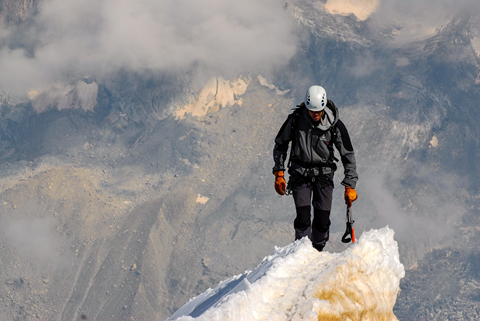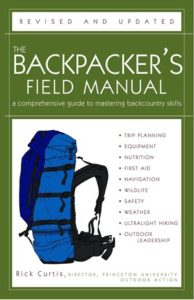Introduction
Since 1962 when Outward Bound first introduced wilderness adventure programing to United States and the world in the mountains of Colorado, the field has grown exponentially. It is now commonplace to find successful wilderness recreation programs in K-12 schools, summer camps, military bases, and city and state parks. The use of outdoor adventure programs for therapeutic reasons has become it’s own industry. And, enrollment in undergraduate and graduate degrees programs in outdoor recreation, education, and therapy is on the upswing.
Within the college/university systems there are three types of outdoor programs:
- Recreation programs typically housed under student life.
- Academic degree programs ± immersion semester(s).
- Cocurricular programs ± immersion semester(s).
Training outdoor leaders within a college/university setting requires a multidisciplinary approach that does not fit well into a standard quarter/semester format due to the type of terrain and time required teach outdoor skills. The purpose of this article is to briefly discuss the design of each program type, list their pros and cons, and provide a conceptual template for those training students to staff some of their programs.
Regardless of the program type, instructor skills can be organized into three separate categories, each with their own topics and progressions.
- Outdoor skills. Outdoor living, technical, rescue, medical, and site management skills required for safety.
- Human skills. The presence, interpersonal, coaching, and counseling skills required for effective human interaction & teaching.
- Educational skills. Functional understanding of activity structure, progression, & basic outdoor education strategies together with the ability to design & manage safe activities.
A fourth skill set, administrative skills, is needed to address all aspects of a program’s design and management. Effective administrators are typically staff trainers with business, management, and leadership training and experience.

Each administrator—again, regardless of the program type—will need to go through a design process similar to that described below:
- Assess the typical student’s outdoor, human, and educational skills when they enter the program’s instructor training/development/degree system.
- Determine the outdoor, human, and educational skills required to lead trips (± for the program) at the end of a normal students’ college experience.
- Design a skill progression to teach the required skills. Each progression has three phases: skills training, mastery (structured & unstructured/personal practice), instruction & management.
- Design for sustainability; avoid building skills courses around transient staff.
Recreation Programs
College and University outdoor recreation programs include Outdoor Orientation Programs (OOP) for incoming students (usually freshman), weekend, and break trips. The programs may be subcontracted to an outside organization or run by professional staff, graduate assistants, or students, or a combination of all three. If any programs are to be run by students, there needs to be an effective training, assessment, and evaluation pro- gression in place.
The training and mastery of most outdoor skills takes multiple years…and mastery is required before a student can learn how to teach a skill or safely lead an outdoor trip. In most college recreation programs it takes a minimum of two years to acquire basic skill mastery for top-rope climbing, canoeing, whitewater kayaking, sea kayaking, backpacking, etc.; more technical or higher risk outdoor activities require additional time. While skill training and the opportunity for mastery can occur during the school year, instructor training needs to occur during the summer break.

- A minimum of two tiers—introductory & advanced trips—are needed to develop the outdoor skills necessary required for potential student instructors and to provide the variety necessary to service the student body/population. Use freshman & sophomore years to develop outdoor technical skills via standard weekend & break trips.
Use clinics to discuss equipment choice, maintenance, & repair. Technical skill courses/trips should conform to established certification standards (even if certification courses will not be available through the institution).
- Second (sophomore) year outdoor skill training provides multiple demonstrations of the information—primarily educational skills—presented during the New Staff Training Course. Students take WFR course during sophomore year.
- Third (junior) year students who have mastered the requisite skills assist Tier 1 trips and take any specific rescue courses required to lead trips during their senior year. Depending on the trip and their skills some juniors may be capable of leading low risk Tier 1 trips, and assisting select Tier 2 trips.
- Fourth (senior) year students who have mastered the requisite instructor skills lead Tier 1 trips and assist numerous Tier 2 trips. Depending on the trip and their skills some seniors may be capable of leading select Tier 2 trips.
All staff trainings are by invitation only; see appendix for summer staff training templates.
- New Staff training introduces teaching & management concepts to increase awareness as students participate in more advanced weekend & break trips during their second (sophomore) year. The New Staff training is taught by professional staff ± graduate assistants and select seniors.
- The Assistant Instructor Staff Training Course reviews the curriculum and site management skills required for the introductory (Tier 1) training courses. Students demonstrating the required skills assist Outdoor Orientation Program trips, weekend trips, and break trips during their junior year. Students take activity specific rescue training course(s) during junior year to prepare them to lead higher-risk trips during their fourth (senior) year. The Assistant Instructor Staff Training Course is taught by professionals staff ± graduate assistants.
- The Instructor Training Course & Outdoor Orientation Program Training reviews curriculum and assesses site management for the introductory training courses and freshman orientation. Assign students specific sites to manage during the training for practice and assessment. Students demonstrating the required skills assist the New Staff Training and lead Freshman Orientation Trip(s), and Tier 1 weekend and break recreation trips during their senior year; if their skills permit they may assist Tier 2 trips. The Instructor Training Course & Outdoor Orientation Program Training is taught by professionals staff ± graduate assistants.
Notes:
- Consider sponsoring instructor certification courses in: top-rope site management, climbing wall site management, river rescue, canoeing, kayaking, rafting, stand-up paddle boarding, LNT, Wilderness First Aid & Wilderness First Responder, and challenge course facilitation.
- It is imperative to clearly choose, design for, and document all skill assessments & evaluations.
Academic Programs
College and university academic programs focusing on outdoor leadership should ideally include one or more immersion semesters. Immersion semesters provide the extended field time necessary to develop mastery of specific outdoor skills simply not possible within the normal quarter/semester format. The initial immersion semester should be at least 50 days in length (75-90 is preferable), taught during the summer between the second and third (freshman & sophomore years), and focus on training basic outdoor skills on both land and water.
A second immersion semester the spring or summer of the third (junior) year should focus on teaching site management, and include one or more short practicums; it may also introduce more advanced skills. All technical skills should conform to established certification standards (AMGA/PCIA for climbing, ACA for water sports, ACCT for challenge courses, AIRE for avalanche/snow pack assessment, and Leave No Trace). The goal for college/university programming is NOT necessarily to certify students but to provide the necessary training and development that will prepare students for certification should the job they are interested in require them. That said, Wilderness First Aid certification should be required prior (or as part of) the initial immersion semester and the Wilderness First Responder certification should be required prior to the second immersion semester, graduation, or instructing/leading any trips. Undergraduate programs should consider offering credit for an extended skill expedition.
Immersion Semester 1
- General campcraft.
- Land & water GPS, compass, and map/chart navigation.
- Leave no trace (LNT).
- Top rope climbing & rappelling including basic anchors and rescue.
- Canoe expeditioning to include lake, moving water, lining, portage, Class 1-3 whitewater.
- Backpacking on and off trail to Class IV travel.
- ± Stand-up paddle boards on flat, moving, and Class 1-2 whitewater (or surf).
- ± Sea kayak skills for lake and ocean travel.
Academic course work should include a core curriculum that meets general education requirements and, if possible, designed with outdoor leadership in mind. Once the general education requirements have been met, students should focus on those courses that will further their specific focus: community/college recreation programs, character education, outdoor therapy, camp management, etc. While a relevant business education is vital for starting or managing a small business, it’s important to bear in mind that effective outdoor program administrators MUST first master the instructor and trainer skill sets. Consider:
- Weather prediction.
- Natural history.
- Geology.
- Psychology. Include specific counseling modalities if the student will minor in outdoor therapy.
- Camp management.
- Managing retail sales and rental programs (necessary for working in a college/commu- nity recreation setting).
- Accounting.
- Small business design and management (including developing a business plan).
- Small group leadership.
- Group dynamics.
- Permits and working with land managers.
- Challenge course design, construction, maintenance, and facilitation.
Advanced degrees (masters and doctorate) should focus on training staff trainers, outdoor program design and management, working with for-profit and not-for-profit boards and other related administrative topics (development, marketing, funding scholarships, advanced finance, human resources, grant writing, understanding GSA and government procurement, etc.).
Cocurricular Programs
Although sometimes difficult to achieve due to internal politics and rules, a well-designed cocurricular program is perhaps the most effective way to train outdoor leaders within a college/university setting because they offer instruction combined with the opportunity to lead trips. Simple cocurricular programs give academic credit for “x” number of skill trainings during the school year and for summer staff trainings. Academic coursework should support the human and educational instructor skill sets. More advanced cocurricular programs typically include one to four immersion semesters. The actual number depend on level of desired skill (outdoor, human, educational) mastery upon graduation and are substituted for weekend and break ± summer staff/instructor trainings. Immersion semester programs may be taught by rotating academic faculty, a combination of academic faculty and rec staff, or subcontracted. As staff are trained to teach and manage outdoor skill activities, they become the assistants and instructors for the university’s weekend and break recreation trips.
Immersion Semesters
Immersion semesters (or quarters) offer students the opportunity to learn and master outdoor skills in a field setting. The power of this type of learning should not be underestimated, especially when coordinated with academic course work and leading recreation trips. Once administrators decide that the practical and academic value of an immersion semester should be part of their outdoor leadership degree, they must decide if they should staff it with “in-house” professors or subcontract it.
In-house Immersion Semester
Pros
- Academic staff are aligned in core mission & strategies.
- Familiar with students. Consistency aids student counseling & development.
Cons
- Burn-out is high because it’s difficult (impossible?) for staff to conduct normal relationships and family life with extended field time.
- When faculty leave their replacement must be hired in alignment with skills to be taught and the school’s core mission & strategies.
Subcontracted Immersion Semester
Pros
- The contracted organization assumes all risk management responsibility for the semester.
- Staff are always available to instruct the course.
- No faculty burn-out = increased satisfaction & retention.
Cons
- Significant planning and training is typically required for contracted staff to be in alignment with the school’s core mission & strategies.
- A potential roadblock exists regarding cost. The overwhelming majority of tuition should go to the contractor who provides the service and additional costs should be minimized. Unfortunately, colleges like to keep all tuition adding the contractor fees on top and unnecessarily raising the cost to the student.
Appendix: Summer Staff Training Templates
- Staff model site management during technical skills training in Blocks 2 & 4 (typically backpacking and canoeing (or rafting/sea kayaking).
- Students keep a daily activity diary describing the activity, whether it was a moving or stationary site, and the basic site management strategies employed.
- Each day is closed with a chalk-talk that reviews, blocks & discusses the day’s activities.
New Staff Training Block OutcomesBlock 1: Opening Workshop
Block 2: Backpacking Expedition
Block 3: Canoe Expedition
Block 4: Closing Workshop
|
New Staff Training Site ProgressionsBlock 1: Opening Workshop
Block 2: Backpacking Expedition
Block 3: Canoe Expedition
Block 4: Closing Workshop
|
- Students keep a daily activity diary describing the activity, whether it was a moving or stationary site, and the basic site management strategies employed including instruc- tor positioning, framing, & closure.
- Each day is closed with a chalk-talk that reviews, blocks & discusses the day’s activities.
Assistant Instructor Canoe Training Block OutcomesBlock 1: Opening Workshop
Block 2: Demo & Skills Assessment
Block 3: Site Management Practice
Block 4: Closing Workshop
|
Assistant Instructor Canoe Training Site ProgressionsBlock 1: Opening Workshop
Block 2: Canoeing
Block 3: Canoeing
Block 4: Closing Workshop
|
- Students keep a daily activity diary describing the activity, whether it was a moving or stationary site, and the basic site management strategies employed including instructor positioning, framing, & closure.
- Each day is closed with a chalk-talk that reviews, blocks & discusses the day’s activities.
Assistant Instructor Backpack Training Block OutcomesBlock 1: Opening Workshop
Block 2: Demo & Skills Assessment
Block 3: Site Management Practice
Block 4: Closing Workshop
|
Assistant Instructor Backpack Training Site ProgressionsBlock 1: Opening Workshop
Block 2: Backpacking
Block 3: Canoeing
Block 4: Closing Workshop
|
- Fourth year (upcoming senior) staff practice site management in pairs during their staff training. Block 2 is land-based site management practice while Block 3 is water- based site management practice.
- Select fourth year (senior) staff assist the New Staff Training and later lead Freshman Orientation trips under supervision of professional staff.


